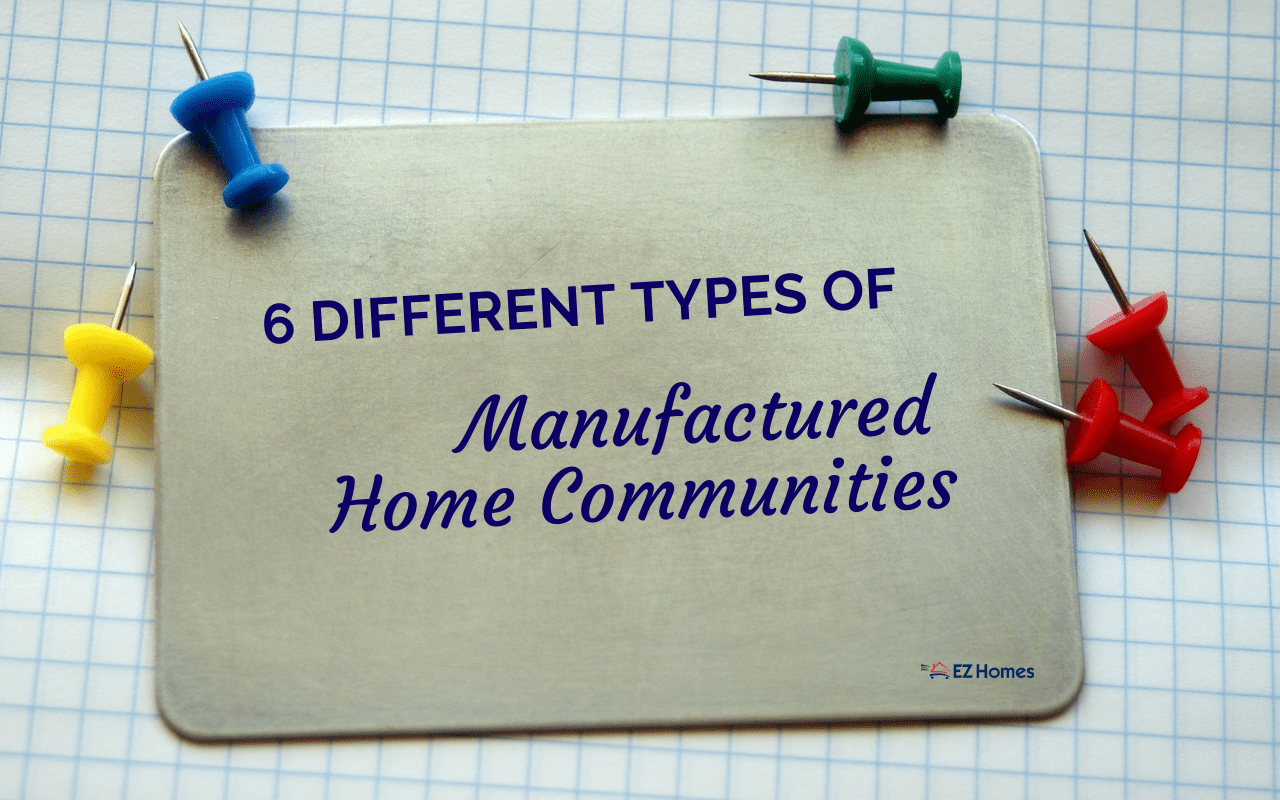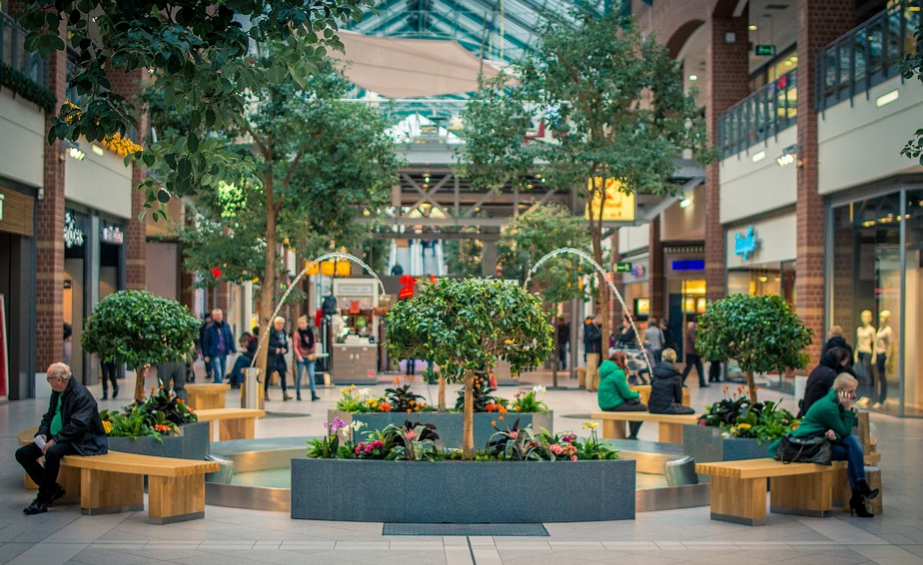One reason many people are hesitant to look at a mobile home community (or omit it from their search) for housing is the lack of knowledge when it comes to the options. Because the manufactured home market is not as well-established as the real estate market, there is a lot of misinformation. People often have a single picture in their mind of what manufactured home communities look like. And unfortunately, they think that’s as far as it goes.
Nothing can be further from the truth.

In this article, we’ll shed some light on the most common types of manufactured home communities that are available to live in right now. We will also provide some information on how they operate and why some are more or less popular than others.
Mobile Home Parks are NOT Trailer Parks
Before we jump into different types of mobile home parks, we’d like to dispel a very persistent myth as well as address one of your questions that might pop up later: What about trailer parks? The relative interchangeability of the terms: trailer, mobile, and manufactured, stems from the fact that the modern manufactured homes we know and love today had their roots in the trailer homes of the 1970s and earlier.
This association with trailers is one of the factors that influence our perceptions, causing mobile homes to remain associated with many negative connotations. The same goes for mobile home parks. The truth is that the manufactured homes of today are a far cry from the mobile homes, and trailers, of yesteryear.
This is mostly due to the federally adopted Manufactured Home Construction and Safety Standards of 1976. It officially rebranded mobile homes as manufactured housing. The standardized safety and quality requirements led to a massive increase in the innovation and credibility of the industry.
Differences between either home
The key differentiators between trailer homes and manufactured homes that play a role in the differences between the communities are:
- Manufactured homes have much longer lifespans. New models can theoretically last indefinitely if properly cared for.
- Manufactured homes aren’t really that mobile. In fact, it’s better for them and their owners that they move as little as possible.
- In many cases, people regard manufactured homes as a fixed asset. And they’re converted to real estate.
Today, people see manufactured homeowners more as stationary, long-term, property owners than “nomads”. Mobile home parks provide long-term housing with a community feel that is more representative of that of a suburb or real estate community. On the other hand, trailer parks still cater more for short-term or temporary visitors, e.g. vacationers. This shows in the lease agreements, amenities, and facilities of the two very different types of parks or communities.
Land-lease community
Land-lease communities are by far the most common type of mobile home community that you’ll find in the U.S. today. In these parks, residents have three options when it comes to becoming a member of the community:
- Buy a home to move to the park and pay rent for the plot of land, aka “lot rent”.
- Buy a mobile home situated in the park and pay for lot rent.
- Lease the home as well as the property as a single rental.
The reason why this is such a popular option is mostly financial. Because most mobile home owners are on a budget when it comes to housing expenses, buying a plot of land, as well as a home, can be too expensive. Property prices in the U.S. are sky high and are still soaring year-by-year. Depending on the state and market conditions, a piece of land could cost more than a home. In contrast, the average lot rent is still in the range of $300 to $900.
Usually, once you become a resident, you’ll have access to all the amenities within the park. The park and land itself will stay the property of the owners of the park. And either could be the landowner’s or a professional park management business.
The con, however …
The one downside to this type of park is that the actual residents have very little say in the future of the park. Big corporations who want to develop into malls or other large-scale projects often buy out mobile home park land. Owners often give in to the irresistible prices offered. And they can give residents as little as twelve months’ notice to move out.

Always refer to the Manufactured/Mobile Home Landlord-Tenant Act if you only rent the lot. The Residential Landlord Tenant Act covers both the home and the lot rent.
Land-owned subdivision community
There can be many different homeowners in a land-owned subdivision community. Because they have a fixed interest and stake in the future of the park, a homeowners’ association (or, HOA) often run these types of mobile home communities. Initially, a landowner or other developer will develop the park. They will then sell lots of land with or without homes to interested parties.
Afterward, the individuals who bought a piece of property inside the community will own it for good. In most cases, the HOA or other governing bodies will still provide certain services to residents of the park. They will also make sure that there are working utilities. Anyone residing within the park can use the public amenities.
Benefits within the community
These amenities, such as pools, common areas, parks, and services (garbage collection, maintenance, and gardening), are often paid for by collecting a levy from tenants. In this way, everyone contributes equally to the condition and operation of the park. Typical levy amounts can vary wildly depending on location, the facilities of the park, etc. In general, the levy is usually between $100 and $300.
These parks are less common mostly because there are smaller margins involved for the developers and landowners and almost no long-term income options. Also, there is a much higher buy-in. Residents will need a home as well as pay for the property upfront. If there is some kind of rent-to-own or down payment options, then it wouldn’t be necessary.
A big plus is that the residents, who are also in the HOA, have a much bigger say in the future of the park. This then translates to a much greater sense of security. Depending on how the HOA works, some majority will need to be reached in order to sell the park. If it goes ahead, the income will be distributed in a fitting way.
Co-op community
It might be easy to confuse a co-op community with a land-owned subdivision as it contains elements of that type of community. However, there are some important differences. In a co-op community, only part of the land (in the form of lots) are owned by residents of the community. These residents are usually some of the first to move into a community. Some may buy lots instead of leasing them.
This group of residents then form something that’s similar to an HOA with many of the same functions of an HOA. The rest of the land and decision-making powers still lie with the initial owners or developers of the community. The latter might provide instructions on how a board of directors or similar entity should be formed from the land-owning residents and what powers they will have.
The rest of the lots will still be leased out to other residents as per the usual in a land-leased community. These residents won’t have any more say in the daily operations of the park than in a land-lease community. Additionally, they will need to defer decision making and management to the HOA and board of directors.
It’s often the case that a permanent, professional mobile home park management team will be assembled to take care of the day-to-day operation and running of the park at the behest of the board of directors.
There are varieties on board

As you might expect, things can get fairly complex regarding the hierarchy of this type of community as you have up to 5 different stakeholders:
- Normal land-lease residents
- Co-op residents
- A co-op resident board of directors
- The owners/developers of the park
- An outsourced mobile home park management team
There is a similarity to the previous type of mobile home community. A levy may be charged to residents of the park that will cover the expenses of the management team, the daily functions of the park, maintenance costs, etc. However, who pays what share can differ from park to park.
Other types of manufactured home communities
Age-restricted retirement communities
Mobile home communities are becoming an increasingly attractive option for retirees. The financial benefits speak for themselves. Statistics and research show that most Americans do not save up adequately for retirement. Moreover, with the baby boomers nearing that stage of their life, affordable housing has become more important than either.
Mobile homes are a great option for those on a budget, especially considering that:
- rent is often less than half that of an old age care community or apartment and
- prices are incomparable to real estate.
Other benefits include:
- enjoying a great quality of life,
- living outside of the bustling city,
- having a community feel, and
- enjoying the privacy of having a piece of land.
You’d be surprised by this!
The most popular type of age-restricted communities are age 55+ communities. So much so that this has almost become a blanket term for this type of park. In reality, there are many different variations, starting from about 45+ to 65+.
The only problem with these types of parks is that they usually don’t provide any elderly care. Their location may also be far from clinics, hospitals, or other medical centers. Many of these communities open a small market to make buying essentials easier for their residents, therefore reducing their dependence on cars.
Luxury manufactured home communities
Stuck in outdated perceptions of mobile homes, many people can’t believe that the terms “manufactured home” and “luxury” can be placed in the same sentence. In fact, if you browse through some of the top manufacturers’ catalogs, you’ll find some amazing designer homes that look straight out of any interior or exterior design magazine.
The increasing popularity, quality, and credibility of manufactured homes have also led to more renovations, upgrades, and additions. And along with the rise of luxury manufactured homes has come the trend of luxury manufactured home parks! Some have even become home to A-list celebrities like Matthew McConaughey. A prime example is Paradise Cove in Malibu.
Seriously luxurious
These parks can have top-of-the-line facilities like Olympic swimming pools, various sporting courts, clubhouses, or even boat clubs for seaside or lakeside communities. Some are found at outrageous locations, such as Paradise Cove (mentioned above). This particular park is located on the cliffs overlooking the ocean and has its own private beach.
However, living in parks like these come with a cost. Mobile home units can reach hundreds, if not millions, of dollars each. Nevermind the exorbitantly high lot rental and levies.
Niche manufactured home communities
The proliferation of mobile home communities and their increased viability as a business venture means that there is now a much wider variety of communities available. The weirdest of these can be very “interesting”, to say the least. You can find anything from pet-friendly communities to parks with a specific style of design.

There are even communities who only allow convicted criminals of some or another type, providing them with a place to stay and distancing them from the rest of society.
One striking example of this that has caught the public’s attention and has caused no small amount of shock is Miracle Village in Florida. This park only allows convicted sex offenders, most of them pedophiles. While it may seem shocking to run a business exclusively for this group of people, it provides a valuable service to the community. Plus it helps to solve the problem of where these individuals go after they are convicted.
There’s a perfect manufactured home community for you!
As you can see, you can expect a wide variety when it comes to choosing the right manufactured home community for you. This should form an important part of your decision-making process. The level of ownership, the form of management, and the general experience these different types of manufactured home communities provide can make or break your experience.


